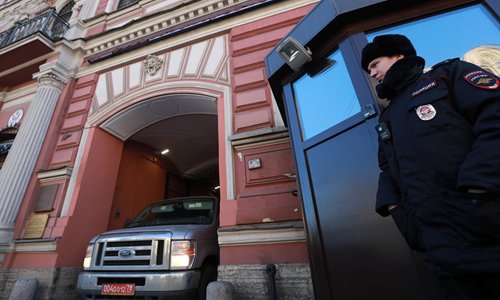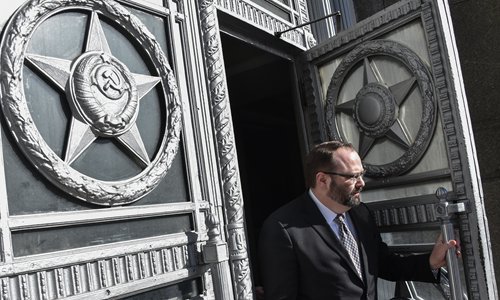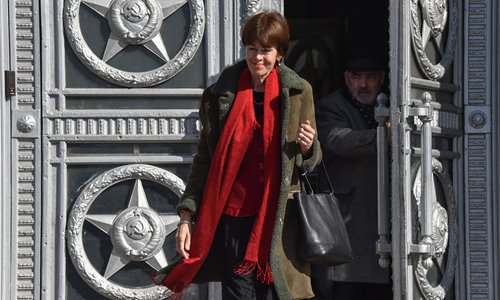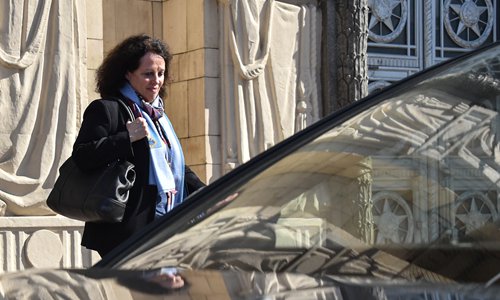
A service car leaves the US Consulate General in St Petersburg after Russia ousted 60 US diplomats and closed the consulate in tit-for-tat response to the US expelling 60 Russian diplomats and closing the Russian Consulate General in Seattle. Photo:VCG
China on Friday urged the US and Russia to solve their diplomatic row with dialogue, following allegations that Moscow was behind the poisoning of a former spy and his daughter which has caused expulsions of diplomats from Russia and some Western countries.
"Russia and the US are influential countries in the world, who share big responsibility for the world's peace and security. We hope they will appropriately solve the dispute via dialogue based on equality and mutual respect," Chinese Foreign Ministry spokesperson Lu Kang told a daily press conference on Friday.
Russia told Britain it had a month to cut the number of its diplomatic staff in Russia to the same number Russia has in Britain on Friday, a day after Moscow expelled 60 US diplomats.
Earlier on Friday Russia had summoned the ambassadors of a number of nations including the UK, France, Germany and Canada to inform them of its retaliatory measures.
Dutch Ambassador Renee Jones-Bos said she had been told two diplomats would be expelled.
"Two of my colleagues are leaving Moscow. But we are staying here," state news agency TASS quoted her as saying.
The White House on Thursday said Moscow's decision marked a further deterioration in the US-Russia relationship.
The Kremlin said Friday it was not Russia that had unleashed a diplomatic war with the West following the mass expulsion of US envoys.
"Russia did not unleash any diplomatic war," Russian President Vladimir Putin's spokesperson Dmitry Peskov told journalists. "Russia never initiated any exchange of sanctions."
"Russia has been forced to take retaliatory steps in response to hostile, illegal actions" by Washington, he said, adding that Moscow wants "good relations" and remained open to dialogue.

Canada's Ambassador to Russia John Kur leaves the Russian Foreign Ministry headquarters in Moscow on Friday. Photos: AFP

Ambassador of the Netherlands to Russia Renee Jones-Bos leaves the Russian Foreign Ministry headquarters in Moscow on Friday. Photo: AFP

France's Ambassador to Russia Sylvie Bermann leaves the Russian Foreign Ministry headquarters in Moscow on Friday. Photo: AFP
The expulsions of Russian diplomats by the US last week precisely mirrored steps taken by other Western governments against Russian diplomats and appeared to show Russia was not seeking to escalate the standoff over the nerve agent poisoning of Sergei Skripal and his daughter Yulia in Salisbury, England, on March 4.
At a meeting with Russian Deputy Foreign Minister Sergei Ryabkov on Thursday, US Ambassador Jon Hunstman was also told that the US consulate in St Petersburg would be closed - a tit-for-tat retaliation for the US closure of Russia's consulate in Seattle.
Yulia Skripal's condition is improving after spending three weeks in critical condition, the hospital where she is being treated said on Thursday.
Following the first known use of a military-grade nerve agent on European soil since World War II, Britain blamed Putin for the attempted murders.
British Prime Minister Theresa May said that Russia was culpable for the attack and urged allies to join in condemning Moscow.
Russia says Britain has failed to produce any persuasive evidence of Russia's guilt.
On March 20, former Soviet scientist, Leonid Rink, who helped create the nerve agent that the UK says was used to poison Skripals, said it was hard to believe Russia was behind the attack because the Skripals did not die immediately, and suggested the UK could have been behind the attack.







